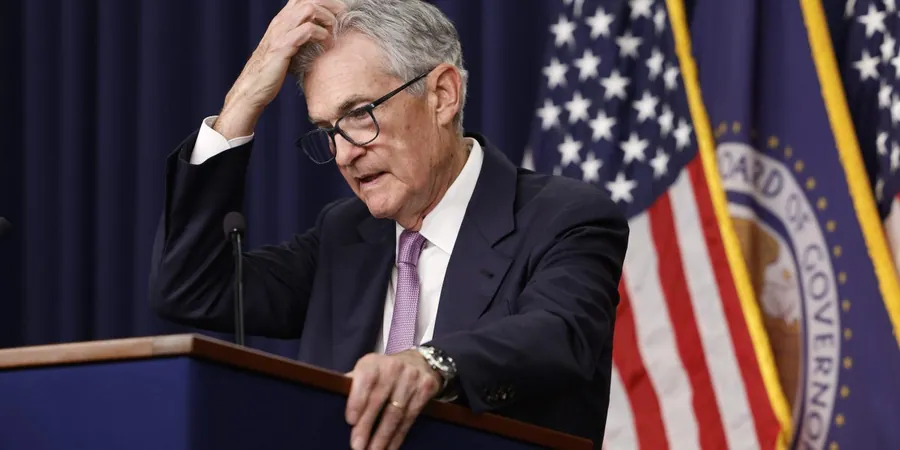
Buyers' Remorse: Wall Street Questions the Fed's Bold Rate Cut Decisions
2024-10-05
Introduction
Analysts at major financial institutions like Bank of America and JPMorgan have recently reassessed their expectations for the Federal Reserve's upcoming policy meeting in November. Initially supportive of a bold half-point rate cut from last month, these analysts are now anticipating a more cautious approach, suggesting a modest quarter-point reduction instead.
Concerns on Wall Street
The doubts circulating on Wall Street highlight a broader concern about the potential repercussions of hastily easing monetary policy. Some experts argue that further cuts could reignite the economy, which has shown resilience, and potentially lead to an uptick in inflation rates once again.
Voices of Caution
One of the notable voices in this debate is veteran economist Ed Yardeni, who expressed to Bloomberg that he views the previous half-point cut as unnecessary and cautions against any further cuts. "I assume several Fed officials regret doing so much," Yardeni stated, indicating that the Fed may need to reconsider their approach to monetary policy in light of current economic data.
Ian Lyngen, the head of U.S. rates strategy at BMO Capital Markets, also weighs in, expecting a quarter-point cut next month but urging caution. He emphasizes that if the forthcoming jobs report and inflation metrics signal stronger-than-expected growth, it may force the Fed to pause their easing plans. "The employment update may prompt the Fed to rethink the timing of any cuts in November," he noted in a recent report.
Former Officials Weigh In
Further adding to the caution, Lawrence Lindsey, a former Fed official and economic director under President George W. Bush, highlighted the close correlation between rate cuts and rising Treasury yields. He suggested that this could indicate that the Fed’s current strategy needs reassessment. "My suspicion is that they’ll probably have to pass on any further cuts at the next meeting," he shared.
Inflation Concerns
The ongoing dialogue around inflation remains stark. Prominent economist Mohamed El-Erian warned that "inflation is not dead," and he urged the Fed to remain vigilant, focusing on price stability while balancing employment concerns. This sentiment was echoed by former Treasury Secretary Larry Summers, who pointed out through his social media platform X that recent wage growth trends complicate the Fed’s decision-making process. Summers described the half-point cut in September as a mistake but noted that it does not carry severe consequences, suggesting that the Fed must navigate "no landing" and "hard landing" risks moving forward.
Macroeconomic Perspective
Moreover, Torsten Sløk, chief economist at Apollo, reiterates a long-standing viewpoint that interest rates may need to remain elevated for a more extended period. He argues that the current strength of the economy, along with previous low rates locked in by consumers, robust fiscal spending, and investments in artificial intelligence, diminish the necessity for additional Fed cuts.
Market Reactions
Even before the latest jobs data was released, other indicators suggested that the September rate cut had already begun to influence the market positively. For instance, the Institute for Supply Management reported surprisingly strong service sector activity for September, underscoring that the Fed’s decisions are already making waves in the economy.
Conclusion
As Wall Street grapples with potential consequences of the Fed’s recent actions and the implications for future policy, one thing remains clear: the stakes are high, and the path ahead is fraught with uncertainty. Investors and economists alike are holding their breath as they await the unveiling of new economic data that could sway the Fed’s next steps—are we facing a bold new era of monetary policy or a cautious retreat from aggressive easing? Keep watching this space for the latest updates on the Fed's critical decisions!



 Brasil (PT)
Brasil (PT)
 Canada (EN)
Canada (EN)
 Chile (ES)
Chile (ES)
 España (ES)
España (ES)
 France (FR)
France (FR)
 Hong Kong (EN)
Hong Kong (EN)
 Italia (IT)
Italia (IT)
 日本 (JA)
日本 (JA)
 Magyarország (HU)
Magyarország (HU)
 Norge (NO)
Norge (NO)
 Polska (PL)
Polska (PL)
 Schweiz (DE)
Schweiz (DE)
 Singapore (EN)
Singapore (EN)
 Sverige (SV)
Sverige (SV)
 Suomi (FI)
Suomi (FI)
 Türkiye (TR)
Türkiye (TR)